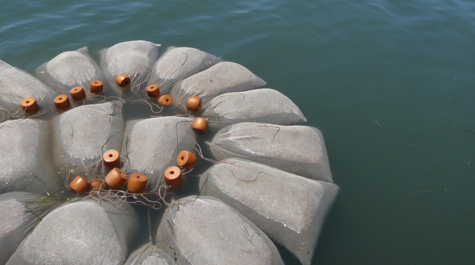VIMS announces winners of 2011 Photo Contest
The Virginia Institute of Marine Science has announced the winners of its annual photo contest, an in-house competition held to recognize and honor the most engaging images taken by VIMS faculty, students, and staff during their scientific work in the field and laboratory.
High-resolution versions of the images are available on the VIMS website at www.vims.edu/photocontest.
The first-place winner for 2011 is postdoctoral research associate Pamela Reynolds, for her photograph of VIMS intern Megan Gyoerkoe carrying a seine net across a marsh. Reynolds took the image in August 2011 during a study of fishes and crabs within eelgrass beds in Middle Marsh, Rachel Carson National Estuarine Research Reserve, Beaufort, North Carolina.
Taking the second-place award was marine technician Paul Richardson for his image of a partially submerged alligator (Alligator mississippiensis) in the shallow waters of Everglades National Park. Alligators range as far north as Merchants Millpond State Park near Sunbury, North Carolina, just a few miles south of the Great Dismal Swamp, which straddles the Virginia-North Carolina border.
The third-place winner was graduate student Wes Hudson, for his early morning image of a great blue heron (Ardea herodias) taken in a small pond near Gloucester Point Beach. The great blue heron is the largest heron in North America and an important part of the Chesapeake Bay ecosystem. Great blue herons feed mostly on small fish, amphibians, crustaceans and aquatic insects.
The selection committee, headed by VIMS Publications Manager Sue Stein, also awarded a number of honorable mentions:
- Brandon Conroy—A crab "megalopa" (final larval stage) collected in a MOCNESS tow during the ANACONDAS project studying the Amazon River plume.
- Aimee Halvorson—A close-up of the mouth of an angel shark caught by the VIMS Juvenile Trawl Survey in lower Chesapeake Bay in July 2010. The shark was subsequently released.
- Matt Mainor—A photomicrograph of diatoms (predominantly of the genus Berkeleya) collected from the York River floway used to grow algae for the Chesapeake Algal Project (ChAP).
- Greg Mears—A lobster photographed during a NEAMAP cruise off the coast of Massachusetts.
- Loren Reller—A driftwood stump washed onto the VIMS shoreline during Hurricane Irene.
- Sarah Sumoski—Freshly collected bags of seagrass ready for transport back to VIMS from a coastal bay on the seaside Eastern Shore. The seagrass will provide seeds to be used in seagrass restoration.
Stein lauded the quality of this year’s photo entries, noting the "wide variety of subject matter" and strengths in both content and composition. She notes that VIMS uses photo-content entries to help illustrate its print publications, outreach materials, and website.









